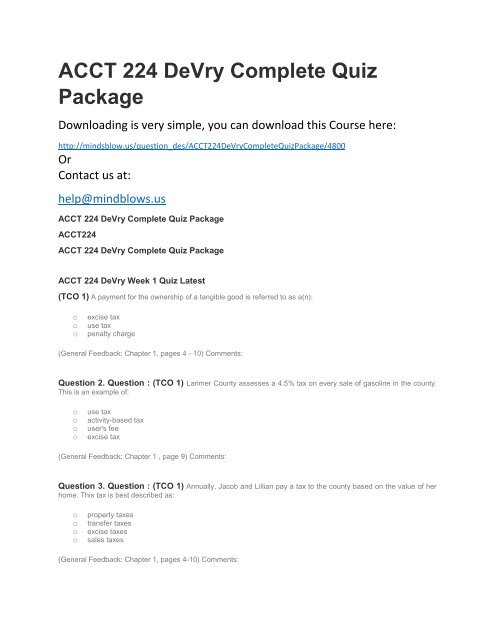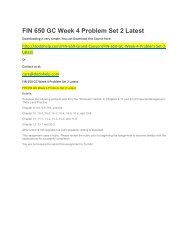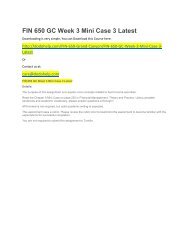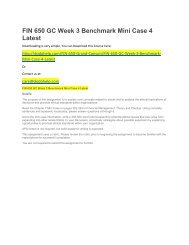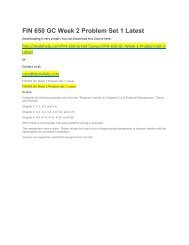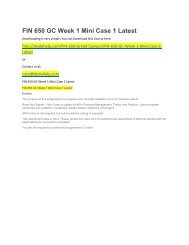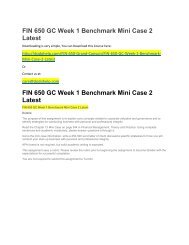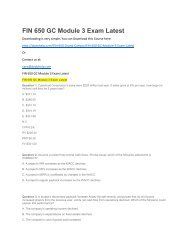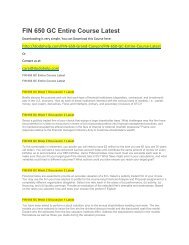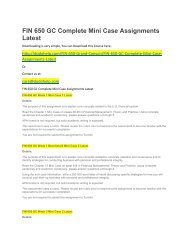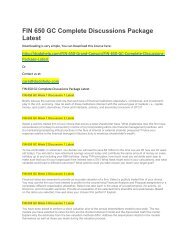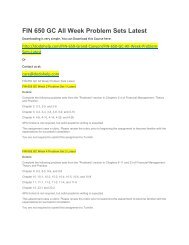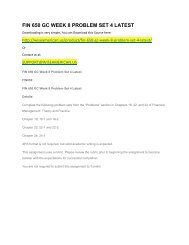ACCT 224 DeVry Complete Quiz Package
Create successful ePaper yourself
Turn your PDF publications into a flip-book with our unique Google optimized e-Paper software.
<strong>ACCT</strong> <strong>224</strong> <strong>DeVry</strong> <strong>Complete</strong> <strong>Quiz</strong><br />
<strong>Package</strong><br />
Downloading is very simple, you can download this Course here:<br />
http://mindsblow.us/question_des/<strong>ACCT</strong><strong>224</strong><strong>DeVry</strong><strong>Complete</strong><strong>Quiz</strong><strong>Package</strong>/4800<br />
Or<br />
Contact us at:<br />
help@mindblows.us<br />
<strong>ACCT</strong> <strong>224</strong> <strong>DeVry</strong> <strong>Complete</strong> <strong>Quiz</strong> <strong>Package</strong><br />
<strong>ACCT</strong><strong>224</strong><br />
<strong>ACCT</strong> <strong>224</strong> <strong>DeVry</strong> <strong>Complete</strong> <strong>Quiz</strong> <strong>Package</strong><br />
<strong>ACCT</strong> <strong>224</strong> <strong>DeVry</strong> Week 1 <strong>Quiz</strong> Latest<br />
(TCO 1) A payment for the ownership of a tangible good is referred to as a(n):<br />
o<br />
o<br />
o<br />
excise tax<br />
use tax<br />
penalty charge<br />
(General Feedback: Chapter 1, pages 4 - 10) Comments:<br />
Question 2. Question : (TCO 1) Larimer County assesses a 4.5% tax on every sale of gasoline in the county.<br />
This is an example of:<br />
o<br />
o<br />
o<br />
o<br />
use tax<br />
activity-based tax<br />
user's fee<br />
excise tax<br />
(General Feedback: Chapter 1 , page 9) Comments:<br />
Question 3. Question : (TCO 1) Annually, Jacob and Lillian pay a tax to the county based on the value of her<br />
home. This tax is best described as:<br />
o<br />
o<br />
o<br />
o<br />
property taxes<br />
transfer taxes<br />
excise taxes<br />
sales taxes<br />
(General Feedback: Chapter 1, pages 4-10) Comments:
Question 4. Question : (TCO 1) The Internal Revenue Code of 1986 is an example of:<br />
o<br />
o<br />
o<br />
o<br />
judicial authority<br />
statutory authority<br />
administrative authority<br />
operational authority<br />
(General Feedback: Chapter 1, pages 14-16) Comments:<br />
Question 5. Question : (TCO 2) If a tax generates enough revenue to pay for public goods and services, it meets<br />
the standard that a good tax should be:<br />
o<br />
o<br />
o<br />
o<br />
sufficient<br />
convenient<br />
efficient<br />
fair<br />
(General Feedback: Chapter 2, pages 22-30) Comments:<br />
<strong>ACCT</strong> <strong>224</strong> <strong>DeVry</strong> Week 2 <strong>Quiz</strong> Latest<br />
(TCO 3) During 2013, Judy, a single taxpayer, 23 years old, had $48,000 of gross income. Her itemized deductions<br />
totaled $6,000. Her 10-year-old brother lived with and was fully supported by her. What is Judy's taxable income for<br />
2013?<br />
o 31,250<br />
o 34,750<br />
o 32,250<br />
o 48,050<br />
Question 2. Question : (TCO 3) Mr. and Mrs. Airs had taxable income of $114,000 for 2013. He was 27; she<br />
was 35. What is their tax liability if they elect to file married filing jointly?<br />
o 20,357.50<br />
o 21,400<br />
o 22,650<br />
o 26,500<br />
Question 3. Question : (TCO 3) Mr. and Mrs. Roberts are joint filers with $90,000 of AGI. The couple has three<br />
dependent children: Jacob, their 19-year-old son, Jared, their 16-year-old son, and Robby, their 8-year-old son. For<br />
2013, their child credit is<br />
o $1,800.<br />
o $2,000.<br />
o $1,200.<br />
o $0.
Question 4. Question : (TCO 3) Which of the following statements concerning extensions of time to file an<br />
individual tax return is true?<br />
o<br />
o<br />
o<br />
o<br />
The extension extends the time for payment of tax.<br />
The first extension is for 6 months.<br />
A second extension of 4 additional months is available with the approval of the Internal Revenue Service.<br />
An extension prevents the taxpayer from owing interest and penalties.<br />
Question 5. Question : (TCO 3) For 2013, Michelle (a single person) had the following tax information:<br />
Wages: $56,000<br />
Itemized deductions: $3,350<br />
Michelle's taxable income for the year is<br />
o 46,000.<br />
o 43,850.<br />
o 45,350.<br />
o 40,550.<br />
(General Feedback: Chapter 14. $56,000 -$6,100 - $3,900)<br />
<strong>ACCT</strong> <strong>224</strong> <strong>DeVry</strong> Week 3 <strong>Quiz</strong> Latest<br />
(TCO 4) Which of the following statements is NOT true?<br />
o<br />
o<br />
o<br />
o<br />
In theory, the IRS should collect the same amount of tax on a worker's compensation, whether the worker is<br />
an employee or an independent contractor.<br />
The IRS believes that contractors pay more taxes than employees.<br />
An employer has a financial incentive to treat workers as independent contractors rather than employees.<br />
If the IRS reclassifies a worker from independent contractor to employee, the employer can become liable for<br />
the employee's share of the unpaid interest and penalties.<br />
(General Feedback: Chapter 15, page 444) Comments:<br />
Question 2. Question : (TCO 4) Tom's annual compensation is $145,000. What is the maximum amount that<br />
Tom's employer may contribute to a defined contribution plan on his behalf in 2013?<br />
o 49,000<br />
o 3,500<br />
o 49,000<br />
o 51,000<br />
(General Feedback: Chapter 15 Contribution is limited to lesser of compensation or $51,000, page 465)<br />
Question 3. Question : (TCO 5) Which of the following statements is NOT true?<br />
o<br />
o<br />
o<br />
o<br />
The interest earned on state and local debt instruments is excluded from income for federal tax purposes.<br />
Treasury notes have maturity periods from one to ten years.<br />
Treasury bonds have maturity periods from 10 to 30 years.<br />
The interest on U.S. debt obligations is subject to federal income tax.
(General Feedback: Chapter 16, pages 494) Comments:<br />
Question 4. Question : (TCO 5) Which of the following is false about the tax policy reasons offered to justify a<br />
preferential tax rate for capital gains?<br />
o<br />
o<br />
o<br />
o<br />
Capital gain accrues over time but is taxed only in the year of sale. Therefore, it is taxed at a higher marginal<br />
rate than would have been likely if gain had been recognized as it accrued.<br />
A preferential rate is not necessary to counteract the effects of inflation.<br />
A preferential rate encourages the mobility of capital.<br />
All of these are not reasons offered to justify a preferential tax rate for capital gains.<br />
(General Feedback: Chapter 16, pages 505-506) Comments:<br />
Question 5. Question : (TCO 5) Julia owns an apartment complex. She is active with respect to this rental<br />
activity. This year, the complex generated a loss of $75,000. Assuming that her AGI before this item is $120,000 and<br />
there are no other passive activities, she may deduct:<br />
o<br />
o<br />
o<br />
o<br />
None, and carry over $75,000 of the loss.<br />
$25,000, and carry over the rest of the loss.<br />
$15,000, and carry over the rest of the loss.<br />
$10,000, and carry over the rest of the loss.<br />
(General Feedback: Chapter 16, pages 508-510. ($120,000-$100,000) * 50%=$10,000, then $25,000 - $10,000)<br />
<strong>ACCT</strong> <strong>224</strong> <strong>DeVry</strong> Week 5 <strong>Quiz</strong> Latest<br />
(TCO 8) Which of the following statements is false?<br />
o<br />
o<br />
o<br />
o<br />
A taxpayer can be charged a penalty for the late payment of taxes even if an extension to file was granted.<br />
The interest charged on the late payment of taxes is not deductible on the federal tax return.<br />
The penalty for late filing and late payment of taxes is 10% of the balance of tax due with the return for each<br />
month it is delinquent.<br />
A taxpayer who can establish a reasonable cause for the late filing of his or her tax return will not be charged<br />
a late filing penalty.<br />
(General Feedback: Chapter 18, pages 574–577) Comments:<br />
Question 2. Question : (TCO 8) Thomas did not extend or file his 2013 federal tax return until December 3,<br />
2014. His total tax liability was $5,000; the return showed a net refund due of $75. He filed late because he was in<br />
Vegas with his old fraternity buddies. What amount of late-filing penalty will he owe for the 2013 tax year?<br />
$2,500<br />
$150<br />
$0<br />
$75<br />
(General Feedback: Chapter 18, page 576. The IRS does not assess a penalty if no tax is due. )
Question 3. Question : (TCO 8) Mr. and Mrs. Lee filed a complete and accurate return for 2013 on April 14,<br />
2014. When will the statute of limitations expire for their 2013 return?<br />
o April 15, 2019<br />
o April 15, 2017<br />
o August 15, 2016<br />
o October 14, 2015<br />
(General Feedback: Chapter 18. The IRS has 3 years from the later of the April 15 due date or the date the return was<br />
actually filed.)<br />
Question 4. Question : (TCO 8) Which of the following is generally considered an indication that Ken has<br />
committed tax fraud?<br />
o<br />
o<br />
o<br />
o<br />
Ken made major addition errors.<br />
Ken's business records and documents were destroyed in a flood.<br />
Ken does not have any receipts for large deductions taken on his tax return.<br />
Ken employed a CPA to prepare his tax return.<br />
(General Feedback: Chapter 18, page 580) Comments:<br />
Question 5. Question : (TCO 8) Which of the following statements concerning the innocent spouse rule is/are<br />
true?<br />
o<br />
o<br />
o<br />
o<br />
The tax deficiency in question must be attributable to the omission of gross income or the claim of bogus<br />
deductions or credits made by both spouses on their joint return.<br />
The innocent spouse must show that he or she did not know, and had no reason to know, that the return<br />
understated the joint federal tax liability.<br />
A spouse is generally relieved of the additional tax liability to the extent that he or she did NOT significantly<br />
benefit from the omitted income and was ignorant of the omission.<br />
All of the above<br />
(General Feedback: Chapter 18, pages 587–588) Comments:<br />
<strong>ACCT</strong> <strong>224</strong> <strong>DeVry</strong> Week 6 <strong>Quiz</strong> Latest<br />
(TCO 9) Which of the following is NOT a realization event for tax purposes?<br />
o Chad found $500 in the street.<br />
o Justin traded a baseball card worth $100 for stock certificates.<br />
o John sold his a bond worth $10,000.<br />
o Jacob sold 100 shares of Google stock.<br />
(General Feedback: Chapter 6, page 129. Realization occurs when the earnings process for goods and services is<br />
complete, regardless of when payment is received.)<br />
Question 2. Question : (TCO 9) In which of these cases is the realization principle applied differently for tax<br />
purposes if the taxpayer is cash basis rather than accrual basis?<br />
o<br />
The taxpayer receives January salary income in December. The taxpayer pays January's water bill in<br />
December.
o<br />
o<br />
There is no difference in the application of the realization principle in these cases.<br />
The realization principle does not apply to cash basis taxpayers.<br />
(General Feedback: Chapter 6 Pages 126 and 136. Cash and accrual taxpayers follow the same rule for prepaid<br />
income, but not for prepaid expenses. )<br />
Question 3. Question : (TCO 9) A company that measures their taxable income from April 1 through March 31<br />
every year has what type of taxable year?<br />
o<br />
o<br />
o<br />
o<br />
Calendar year<br />
Fiscal year<br />
Temporary year<br />
None of the above are correct<br />
(General Feedback: Chapter 6, page 119)<br />
Question 4. Question : (TCO 9) What is a permanent source of a book/tax difference?<br />
o<br />
o<br />
o<br />
o<br />
Prepaid income<br />
Bad debts<br />
Related party accruals<br />
Interest on state and local bonds<br />
(General Feedback: Chapter 6, page 144)<br />
Question 5. Question : (TCO 9) In which of the following instance(s) is the measurement of net income for tax<br />
purposes different for accrual basis and cash basis calendar year taxpayers?<br />
o<br />
o<br />
o<br />
o<br />
In December, the taxpayer signs a contract for routine legal service to be performed in December and paid<br />
for in January of the following year.<br />
The taxpayer's equipment is repaired in November and the bill is paid in December.<br />
The measurement of net income is different in both of these cases.<br />
Net income would be the same under both cash and accrual methods.<br />
(General Feedback: Chapter 6. The concept of substantial economic performance means that the accrual basis<br />
taxpayer cannot deduct the cost until the work is performed, unless the work is routine and paid within nine months.<br />
The concept does not apply here.)<br />
<strong>ACCT</strong> <strong>224</strong> <strong>DeVry</strong> Week 7 <strong>Quiz</strong> Latest<br />
(TCO 10) The tax basis of an asset includes:<br />
o<br />
o<br />
o<br />
o<br />
the fair market value of property received in a non-taxable exchange.<br />
the fair market value of services given in exchange.<br />
the amount of debt relief given in the exchange.<br />
All of the above<br />
(General Feedback: Chapter 7, lecture) Comments:
Question 2. Question : (TCO 10) In general, an expenditure must be capitalized for tax purposes if:<br />
o<br />
o<br />
o<br />
o<br />
it creates or enhances an asset with a useful life of one taxable year.<br />
it results in no long-term benefit to the firm.<br />
tax treatment of the expenditure is certain.<br />
None of the above<br />
(General Feedback: Chapter 7, page 158) Comments:<br />
Question 3. Question : (TCO 10) On December 15, a calendar year taxpayer placed in service $100,000 of fiveyear<br />
recovery property. If this was in addition to another $250,000 of assets placed into service early in the year, it will<br />
be subject to:<br />
o<br />
o<br />
o<br />
o<br />
the mid-quarter convention.<br />
the mid-month convention.<br />
the half-year convention.<br />
no convention.<br />
(General Feedback: Chapter 7, page 168-169) Comments:<br />
Question 4. Question : (TCO 10) Bent Pretzel Inc. sold a building that it held for investment for several years.<br />
In this transaction, Bent Pretzel received land that it will use in its business. The FMV of the building is $80,000 and<br />
the value of the land is $80,000 too. The adjusted basis of the building is $55,000 and the land is $30,000.<br />
What is Bent Pretzel's recognized gain?<br />
o $55,000<br />
o $25,000<br />
o $80,000<br />
o $0<br />
(General Feedback: Chapter 9. Like-kind exchange; no boot.) Comments:<br />
Question 5. Question : (TCO 10) In a qualifying like-kind exchange, Van Halen exchanges musical equipment<br />
with an adjusted basis of $350,000 (fair market value of $300,000) for other musical equipment.<br />
What is his basis in the new equipment?<br />
o $200,000<br />
o $225,000<br />
o $350,000<br />
o $230,000<br />
(General Feedback: Chapter 9. The FMV of the property received transfer basis ($300,000) plus the loss not recognized<br />
($50,000).)


